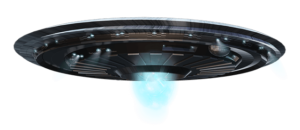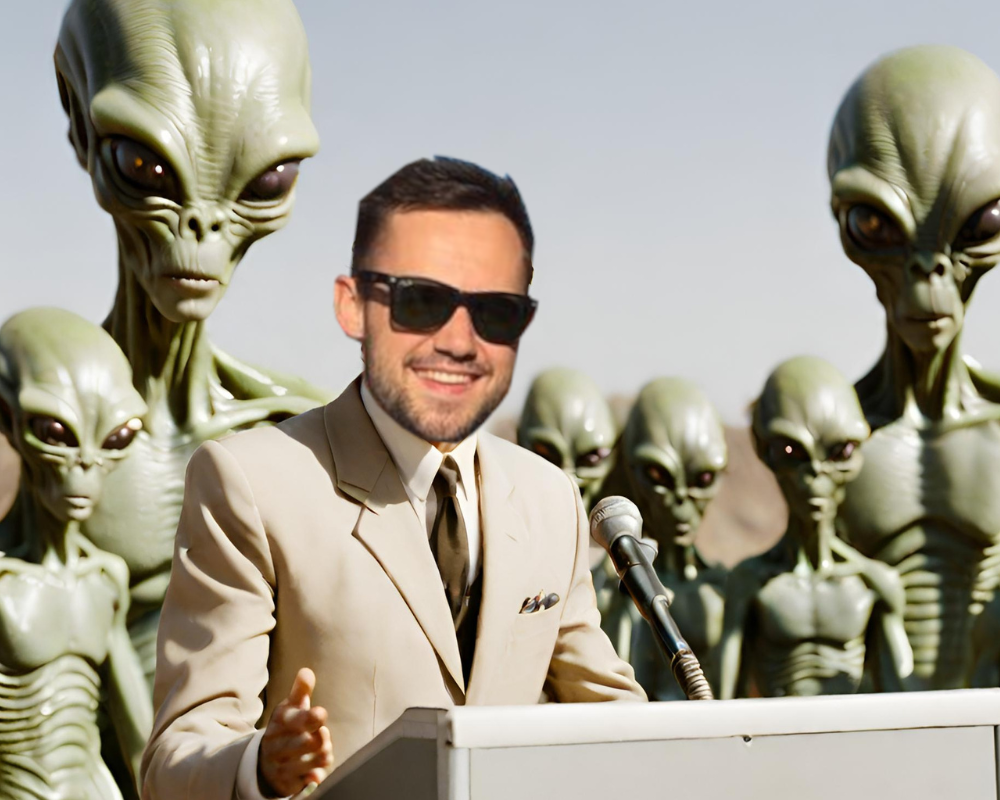Once upon a time, in a world teeming with life and wonder, Earth found itself facing an unexpected and daunting challenge. Aliens from a distant galaxy descended upon the planet, their spaceships casting dark shadows over once bustling cities. Panic and fear gripped humanity as they prepared for what seemed like an inevitable defeat.

Amidst the chaos, Christian, the wacky young philosopher, recognised that the power of logic could hold the key to resolving this interstellar conflict. With his unyielding belief in the strength of rationality, he set out on a mission to engage the alien invaders in a battle of intellect.
Christian, armed not with weapons but with the force of his persuasive arguments, sought a meeting with the alien leaders. He was granted an audience, surrounded by a gathering of extraterrestrial beings whose appearance was both awe-inspiring and intimidating.
Confident in his abilities, Christian took the stage. He calmly acknowledged the alien’s superior technology and military might but emphasised that true intelligence was not measured solely by the ability to conquer. He argued that the essence of intelligence lay in understanding, empathy, and the ability to engage in reasoned discourse.

Using examples from Earth’s history, Christian highlighted the triumphs of diplomacy and cooperation over conflict and aggression. He presented case studies of how humans had overcome their own differences and worked together to achieve remarkable advancements. He pointed out that logic dictated that the aliens’ goals would be better served through mutual understanding and peaceful coexistence.
Christian skilfully weaved a tapestry of logical reasoning, demonstrating how conflict and destruction would only lead to a lose-lose situation. He urged the aliens to consider the potential for collaboration, emphasising that Earth had much to offer in terms of philosophy, culture, and scientific knowledge.
As Christian spoke, the alien leaders, who had initially appeared cold and unyielding, began to show signs of curiosity and contemplation. They exchanged glances and whispered among themselves, seemingly intrigued by this human’s audacious approach.
 In response, the alien leader stepped forward, extending a hand in a gesture of peace. Through a translator device, they conveyed their appreciation for Christian’s logical arguments, acknowledging that they had not anticipated encountering a species capable of such persuasive reasoning.
In response, the alien leader stepped forward, extending a hand in a gesture of peace. Through a translator device, they conveyed their appreciation for Christian’s logical arguments, acknowledging that they had not anticipated encountering a species capable of such persuasive reasoning.
The conversation continued, as Christian and the alien leaders engaged in a spirited debate about the shared values of both civilisations. They explored the possibilities of intergalactic cooperation, envisioning a future where knowledge, resources, and technology could be exchanged for the benefit of all.
As news of Christian’s successful debate spread, hope began to flicker within the hearts of people worldwide. Inspired by his example, individuals from diverse backgrounds engaged in their own discussions, applying logic and empathy to resolve differences.
Over time, a newfound understanding blossomed between Earth and the alien civilisation. The exchange of ideas, culture, and knowledge became the foundation of a mutually beneficial relationship. The alien invasion, once a source of fear and despair, transformed into an opportunity for growth and unity.
Christian’s logical arguments had triumphed over conflict, proving that reason could transcend even the deepest divides. His achievement became a testament to the power of open-mindedness, empathy, and the willingness to engage in respectful debate.
And so, in the wake of the alien invasion, Earth stood as a shining example of the transformative potential of logic and understanding. Christian’s legacy as the wacky young philosopher who saved humanity by winning over the alien invaders became an enduring symbol of hope and inspiration for generations to come.
